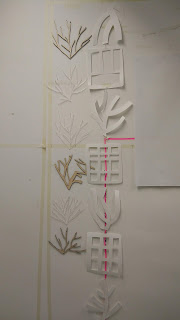Third Year: Project 1, Week 2
This week I have enjoyed working in black and white, and challenging
myself to draw and represent nature with a restricted range of colours and
shades.
My tutorial on Monday highlighted the fact that the work
completed in the first week was vague and lacked direction. My use of colour
was discussed, and we agreed that I have a tendency to default to a preferred
colour palette, incorporating blues, greens and natural tones. The drawing I had
been doing in the first week was fairly unimaginative and ‘meadow-like’, not
the outcome I hoped for.
Therefore, I decided to commit to using just black and white
in my work. This is quite a challenge for me as I love to use colour in my
work, especially natural, earthy, calming tones, but this was not inspiring me
to create experimental and exciting drawings and samples. Another problem for
me can be straying from my decided colour palette, leading to my work lacking a
strong identity.
Over the course of this week, I have actually really enjoyed
working in monochrome – much more than I expected I would. I predicted that it
would frustrate me but in fact the opposite has happened. It has allowed me to
think more about line, shape and form and has unbound my thinking around sampling.
It now seems appropriate to consider techniques such as laser cutting into Perspex,
which could lend a technical and structured element to my work and give my
drawing a new dimension in 3D form.
 |
| Monochrome drawing responses. |
For my new direction, I have been researching artists who
work in black and white and who draw inspiration from unconventional aspect of
nature, such as twigs, rocks and the structures of plants, rather than plants
as a whole. This has led me to the work of photographer Karl Blossfeltd, who’s
dramatic photographs show plants up close in high contrast black and white,
really focusing on the lines and form of plants. As well as this, Antony
Gormley’s black and white drawings of bodies suggest form and movement
effectively in monochrome. I have also been inspired by Andy Goldsworthy’s
natural sculptures, which have inspired me to create 3D, sculptural samples,
though laser cutting into Perspex and fabric. Bridget Riley, Steven Meyers and
Evan Gruziz’s work has also provided inspiration.
Another contemporary designer who I have been researching is
Diana Scherer, a German artist based in Amsterdam who has worked with plant
fibres and roots and has created clothing from interwoven plant roots. I saw
her work at the exhibition Fashioned from
Nature at the V & A and this influenced some of my paper cutting. If I
had longer on this project, I would delve into the use of plant fibres in
sustainable fashion and textile production.
 |
| One of Diana Scherer's garments made from plant fibres and roots. |
After drawing in black and white, I decided to use paper
cutting to highlight the lines and contrast in the natural forms I have been
using for inspiration. I love paper cutting, and It felt like an appropriate
way to develop my response to the theme. I plan to develop my paper cuts by
screen printing, laser cutting and digital designing.
 |
| Paper cut designs. |
I made a screen of two of my paper cut designs and spent a day in the print room, experimenting with different fabrics and textures when screen printing. I also used devore on a white velvet fabric. This was an interesting learning experience, as I didn’t realise that to achieve the best results it is better to apply the devore paste on the reverse of the fabric. I have some samples now where I have done the devore on the back and some where I have done it on the front, and I think the contrast in effects could develop into some interesting samples. The ones where the devore was done on the front actually give quite a good shadowy effect.
 |
| Screen-printed and Devore samples. |
Now I plan to embellish my screen-printed samples with hand
and machine embroidery, create some digital repeat designs, do some more paper
cutting and get on the laser cutter next week. I will also be photographing my
work to explore the effect of light and shadow and view my samples from
different angles.
I have realised that a lot can be achieved in a week when
you challenge yourself and do something out of your comfort zone. I was wary of
doing a project in black and white, but it has opened my thinking, and in some
ways allowed me to think more simply but be bolder with design and
experimentation.








Comments
Post a Comment